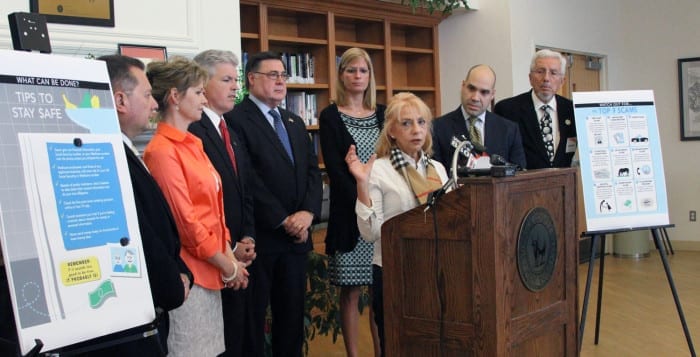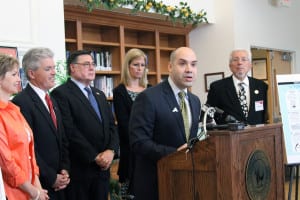Officials caution Mount Sinai seniors against scam

“Don’t trust anyone.”
That’s what Bernard Macias of AARP advised seniors to do at a press conference held at the Rosa Caracappa Senior Center in Mount Sinai regarding phone scams across Suffolk County.
“It’s happening more and more than you think,” he said. “Clearly, for AARP, we’re here to protect people 50 and over, but we’re finding that our member’s children and grandchildren and being faced with this. Don’t trust anyone, really, because they’re constantly changing those scams.”

Suffolk County Executive Steve Bellone (D) said that in 2015, the total cost of financial fraud against seniors across the country was $36.5 billion. Although anyone can be a victim of scam, con artists particularly prey on seniors, he said.
“That is an extraordinary sum that is being stolen from our citizens,” he said. “Tax day is April 15, it is fast approaching and it is a time that scam artists are working hard to get a hold of people’s hard-earned money.”
Bellone said that in one instance, a scamming entity posed as the Internal Revenue Service and said that if the person did not provide a certified check or transfer funds to the agency, they would be imprisoned. The caller went so far as the tell the victim that they would remain on the line until the woman reached her bank and successfully wired the funds to an account that was provided, he said.
Luckily, the bank manager recognized the customer and noticed that she looked and sounded worried, Bellone said. The victim told the manager about the person she was on the phone with, and the manager was able to stop the scam from happening.
This week is National Consumer Protection Week and as a result, Bellone said the county is urging citizens to remain informed. He said so far, Suffolk County Consumer Affairs has recovered over $534,000 through its investigations on behalf of county residents.
“These scammers use all kinds of threats and demands to gain access to your accounts, and threaten your identity,” he said.
The county executive urged those who felt vulnerable to a scam to file a complaint with the consumer affairs department by calling (631) 853-4600.
To avoid an IRS scam, Brookhaven Supervisor Ed Romaine (R) said that AARP offers free tax filings for senior citizens. Some locations in the town include the senior center and town hall, among local libraries, he said.

Maggie Hamm, of Leisure Village, received two suspicious phone calls within three weeks. She said that during the one call she did answer, TD Bank was mentioned. Hamm used to have an account with the organization, which she said piqued her interest in listening to what the caller had to say. The person on the other end of the phone mentioned having or owing money, which she said sounded off.
“I asked, ‘is this a scam? And boom, he hung up the phone,” she said. “You just know — you get a vibe and a red flag goes off. I think as we get older you don’t want to make any waves, and I understand seniors become afraid and concerned, because they don’t want any trouble, but you can’t be afraid to step forward and say no.”
Suffolk County Legislator Sarah Anker (D-Mount Sinai) said she too received two messages on her phone that were related to scams.
“Help us help you,” is what the caller said at the end of one of the messages.
Anker said she tried to call back the number, but the call didn’t go through.
“People will actually fall for it,” Anker said. “They’re trying to catch the person on the phone right away, because once they get you in person, the level of scamming has increased.”
She asked residents to call the Suffolk County Police Department to report the scam as a crime, at (631) 852-COPS. Two years ago, the legislator also created a scam alert website, SCPDscamalert.org, which has more information on how to protect yourself against incidents involving scam.
Councilwoman Jane Bonner (C-Rocky Point) said that calling 4(631) 51-TOWN would also provide residents with more information.
“If it doesn’t seem right, it probably isn’t right,” she said. “You should always follow your instincts and your gut, and the government will never call you when you’ve done something wrong. They’re required to mail you as proof of documentation. Don’t fall prey to the phone call.”

Macias, who said AARP serves over 500,000 members on Long Island, said, in light of tax day, to mail in tax returns as early in the season as possible, not to give out personal information and to shred all personal documents.
Three important facts Macias said to understand is that the IRS will never call and demand payment over the phone, the IRS does not ask for credit or debit card information over the phone and the IRS does not threaten to bring local law enforcement to your home.
“Scam artists continue to devise new things and new schemes that are becoming more and more difficult to detect, which is why AARP developed the AARP Fraud Watch Network as a way to protect people,” he said.
By logging onto aarp.org/money and clicking on the Consumer Protection tab, residents can access a link to the company’s Fraud Watch Network. There, anyone can sign up to get AARP’s Watchdog Alerts on scammers’ latest tricks and find out what to do if you’ve been victimized.
“You’re not only helping yourself, but helping other who may fall victim to the same scam,” Bellone said. “Don’t feel embarrassed to come forward. Feel empowered to help educate and protect others.”






